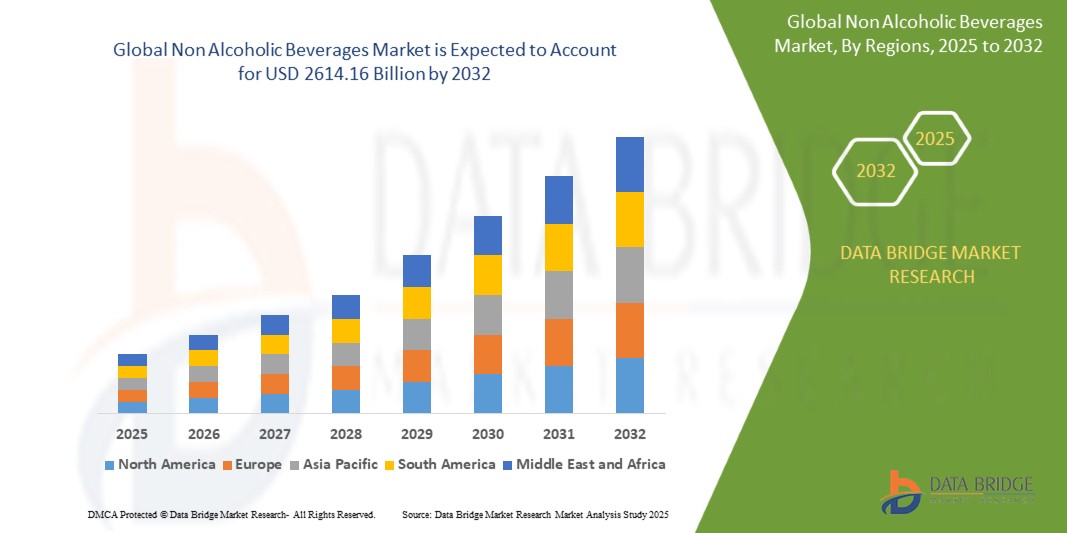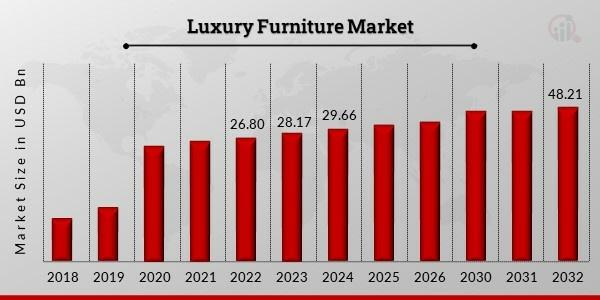"Regional Overview of Executive Summary Non Alcoholic Beverages Market by Size and Share
Global non alcoholic beverages market size was valued at 1,796.60 Billion in 2024 and is projected to reach USD 2614.16 Billion by 2032, with a CAGR of 4.80% during the forecast period of 2025 to 2032

Deliberately analyzed facts and figures of the market and keen business insights mentioned in Non Alcoholic Beverages Market report would be a key aspect in accomplishing enduring business growth. The report gives better business ideas and solutions with respect to Non Alcoholic Beverages Market industry in terms of product trends, marketing strategy, future products, new geographical markets, future events, sales strategies, customer actions or behaviors. In-depth and comprehensive market study conducted in the worldwide Non Alcoholic Beverages Market report offers up to date and forthcoming opportunities to be aware about the future market investment.
The persuasive Non Alcoholic Beverages Market report displays the systematic investigation of existing scenario of the market, which takes into account several market dynamics. The careful efforts accompanied with integrated approaches gives an output of such excellent market research report that drives the decision making process of the business. This market study also evaluates the market status, market share, growth rate, sales volume, future trends, market drivers, market restraints, revenue generation, opportunities and challenges, risks and entry barriers, sales channels, and distributors. Talented capabilities and brilliant resources in research, data collection, development, consulting, evaluation, compliance and regulatory services work together to formulate the world-class Non Alcoholic Beverages Market research report.
Learn how the Non Alcoholic Beverages Market is evolving—insights, trends, and opportunities await. Download report:
https://www.databridgemarketresearch.com/reports/global-non-alcoholic-beverages-market
Non Alcoholic Beverages Market Introduction
**Segments**
- **Product Type**: The non-alcoholic beverages market can be segmented based on product type into carbonated drinks, fruit juices, energy drinks, functional beverages, and others. Carbonated drinks hold a significant share in the market due to their popularity and wide availability.
- **Distribution Channel**: Distribution channels for non-alcoholic beverages include supermarkets/hypermarkets, convenience stores, online retail, and others. Supermarkets/hypermarkets are the leading distribution channel due to the wide range of products they offer and consumer preference for one-stop shopping.
- **Region**: The market can also be segmented by region into North America, Europe, Asia-Pacific, Latin America, and Middle East & Africa. Asia-Pacific holds a substantial market share due to the increasing disposable income and changing consumer preferences in countries like China and India.
**Market Players**
- **The Coca-Cola Company**: One of the leading players in the global non-alcoholic beverages market, offering a wide range of products such as Coca-Cola, Sprite, and Minute Maid.
- **PepsiCo, Inc.**: Another key player in the market known for brands like Pepsi, Mountain Dew, and Tropicana, catering to different consumer preferences.
- **Nestlé S.A.**: With a focus on healthier beverage options, Nestlé offers products like Nestea and Nesquik in the non-alcoholic beverages segment.
- **Danone**: Known for its emphasis on probiotic and functional beverages, Danone provides products such as Actimel and Evian in the market.
- **Keurig Dr Pepper**: A prominent player offering a diverse portfolio of brands including Dr Pepper, Snapple, and 7UP in the non-alcoholic beverages market.
The global non-alcoholic beverages market is competitive and dynamic, with key players constantly innovating to meet consumer demands and preferences. Factors such as changing lifestyle trends, increasing health consciousness, and the rise of e-commerce platforms are influencing the market landscape. Companies are focusing on product diversification, packaging innovations, and strategic partnerships to gain a competitive edge in the market. The convenience of ready-to-drink beverages and the demand for natural and organic ingredients are also driving market growth. Overall, the non-alcoholic beverages market is expected to continue expanding globally, with emerging economies playing a significant role in shaping the industry's future.
The global non-alcoholic beverages market is witnessing a shift towards healthier beverage choices driven by increasing consumer awareness and emphasis on well-being. As consumers become more health-conscious, there is a growing demand for functional beverages that offer added benefits such as vitamins, minerals, and other nutrients. This trend is prompting market players to innovate and introduce new products that cater to this evolving consumer preference. Functional beverages are gaining popularity not only for their nutritional value but also for their perceived health benefits, such as immune support, gut health, and energy enhancement.
Moreover, sustainability initiatives are becoming increasingly important in the non-alcoholic beverages market. Consumers are showing a stronger preference for sustainable and eco-friendly products, leading companies to adopt environmentally friendly practices in packaging, sourcing ingredients, and production processes. This shift towards sustainability is not only driven by consumer demand but also by regulatory pressure and corporate social responsibility commitments. Market players are investing in recyclable packaging, reducing carbon emissions, and promoting ethical sourcing practices to align with the growing sustainability expectations of consumers.
Another key trend shaping the non-alcoholic beverages market is the rise of premiumization. Consumers are willing to pay a premium for high-quality, premium non-alcoholic beverages that offer unique flavors, exotic ingredients, and sophisticated packaging. Premiumization is driven by the desire for indulgence, authenticity, and a superior sensory experience. Market players are leveraging this trend by introducing upscale and luxury beverage options that target discerning consumers seeking a premium drinking experience.
The digital transformation of the non-alcoholic beverages market is also playing a pivotal role in shaping its dynamics. E-commerce platforms are increasingly becoming important channels for product distribution, allowing consumers to conveniently purchase beverages online and have them delivered to their doorstep. This shift towards online retail is creating new opportunities for market players to reach a wider audience, personalize marketing strategies, and enhance the overall consumer shopping experience.
In conclusion, the global non-alcoholic beverages market is evolving rapidly, driven by changing consumer preferences, sustainability concerns, premiumization trends, and the digital transformation of the industry. Market players need to adapt to these trends by innovating their product offerings, adopting sustainable practices, embracing premiumization strategies, and leveraging digital platforms to stay competitive in this dynamic market landscape. The future of the non-alcoholic beverages market will be shaped by continued innovation, sustainability initiatives, premiumization efforts, and a seamless integration of digital technologies to meet the evolving needs of consumers worldwide.The global non-alcoholic beverages market is experiencing a significant shift in consumer preferences towards healthier options, driven by a growing awareness of well-being. This has led to a surge in demand for functional beverages that offer added nutritional benefits such as vitamins, minerals, and other nutrients. Market players are responding to this trend by introducing innovative products that cater to the evolving needs of health-conscious consumers. Functional beverages are not only valued for their nutritional content but also for their perceived health benefits, including immune support, gut health, and energy enhancement. As a result, the market is witnessing a steady increase in the availability and variety of functional beverages to meet the diverse demands of consumers seeking healthier drink options.
Sustainability has emerged as a key focus in the non-alcoholic beverages market, with consumers showing a strong preference for eco-friendly and sustainable products. Companies are increasingly adopting environmentally friendly practices in packaging, sourcing ingredients, and manufacturing processes to align with changing consumer expectations and regulatory requirements. The shift towards sustainability is not only driven by consumer demand but also by corporate social responsibility commitments and the need to mitigate environmental impact. Market players are investing in recyclable packaging, reducing carbon emissions, and promoting ethical sourcing practices to meet the growing sustainability standards of consumers.
Premiumization is another significant trend shaping the non-alcoholic beverages market, where consumers are willing to pay a premium for high-quality, upscale beverage options that offer unique flavors, exotic ingredients, and sophisticated packaging. This trend is driven by the desire for indulgence, authenticity, and a superior sensory experience. Market players are capitalizing on this trend by introducing luxurious and premium beverage choices to target discerning consumers looking for a premium drinking experience. The rise of premiumization has opened up new opportunities for market players to differentiate their offerings and cater to the evolving tastes of consumers seeking a more sophisticated beverage experience.
Furthermore, the digital transformation of the non-alcoholic beverages market is playing a crucial role in reshaping its dynamics. E-commerce platforms have become increasingly vital for product distribution, enabling consumers to conveniently purchase beverages online and have them delivered to their homes. This shift towards online retail presents new avenues for market players to reach a broader audience, personalize marketing strategies, and enhance the overall consumer shopping experience. By embracing digital platforms, companies can adapt to changing consumer preferences, streamline distribution channels, and engage with consumers in a more personalized and efficient manner.
In conclusion, the global non-alcoholic beverages market is undergoing a rapid evolution driven by changing consumer preferences, sustainability imperatives, premiumization trends, and the integration of digital technologies. Market players must continually innovate their product offerings, adopt sustainable practices, embrace premiumization strategies, and leverage digital platforms to remain competitive in the dynamic market landscape. The future of the non-alcoholic beverages market will be shaped by ongoing innovation, sustainability initiatives, premiumization efforts, and the seamless integration of digital technologies to meet the evolving needs of consumers worldwide.
Gain insights into the firm’s market contribution
https://www.databridgemarketresearch.com/reports/global-non-alcoholic-beverages-market/companies
Non Alcoholic Beverages Market – Analyst-Ready Question Batches
- Which companies are focusing on eco-friendly products?
- What product sizes or variants are in demand for Non Alcoholic Beverages Market?
- What advertising strategies dominate the Non Alcoholic Beverages Market?
- How does regional infrastructure affect distribution?
- Which markets are price-sensitive?
- What is the impact of inflation on this Non Alcoholic Beverages Market?
- How long is the average product lifecycle?
- What mobile shopping trends influence the Non Alcoholic Beverages Market?
- What is the role of certifications and standards?
- Are import tariffs affecting market entry?
- What are the key KPIs for success in this Non Alcoholic Beverages Market?
- How is product differentiation achieved?
- What percentage of the Non Alcoholic Beverages Market is recurring revenue?
- What are the trends in subscription-based models?
Browse More Reports:
Global Coloboma, Heart Defects, Atresia Choanae, Growth Retardation, Genital Abnormalities, and Ear Abnormalities (CHARGE) Syndrome Treatment Market
Global Colorectal Cancer Diagnostics Market
Global Commercial Seeds Market
Global Concrete Delivery Hose Market
Global Containers as a Service Market
Global Contrast-Enhanced Ultrasound Market
Global Convertible Roof System Market
Global Coordinate Measuring Machine Market
Global Cord Blood Banking Service Market
Global Corneal Topography and Tomography Systems Market
Global Cosmetic Skin Care Market
Global Cough Suppressant Drugs Market
Global C-Reactive Protein Testing Market
Global Crystalline Ceramic Fibers Market
Global Custom Flash Module Market
About Data Bridge Market Research:
An absolute way to forecast what the future holds is to comprehend the trend today!
Data Bridge Market Research set forth itself as an unconventional and neoteric market research and consulting firm with an unparalleled level of resilience and integrated approaches. We are determined to unearth the best market opportunities and foster efficient information for your business to thrive in the market. Data Bridge endeavors to provide appropriate solutions to the complex business challenges and initiates an effortless decision-making process. Data Bridge is an aftermath of sheer wisdom and experience which was formulated and framed in the year 2015 in Pune.
Contact Us:
Data Bridge Market Research
US: +1 614 591 3140
UK: +44 845 154 9652
APAC : +653 1251 975
Email:- corporatesales@databridgemarketresearch.com
"

